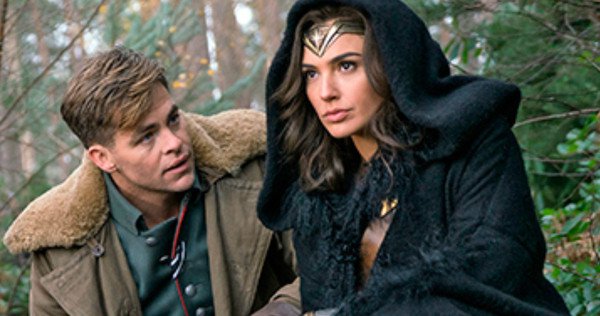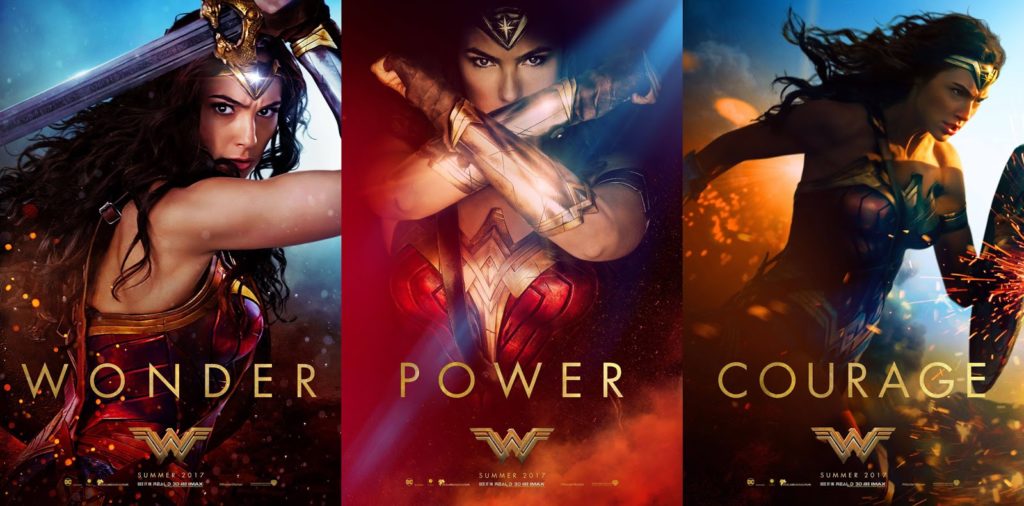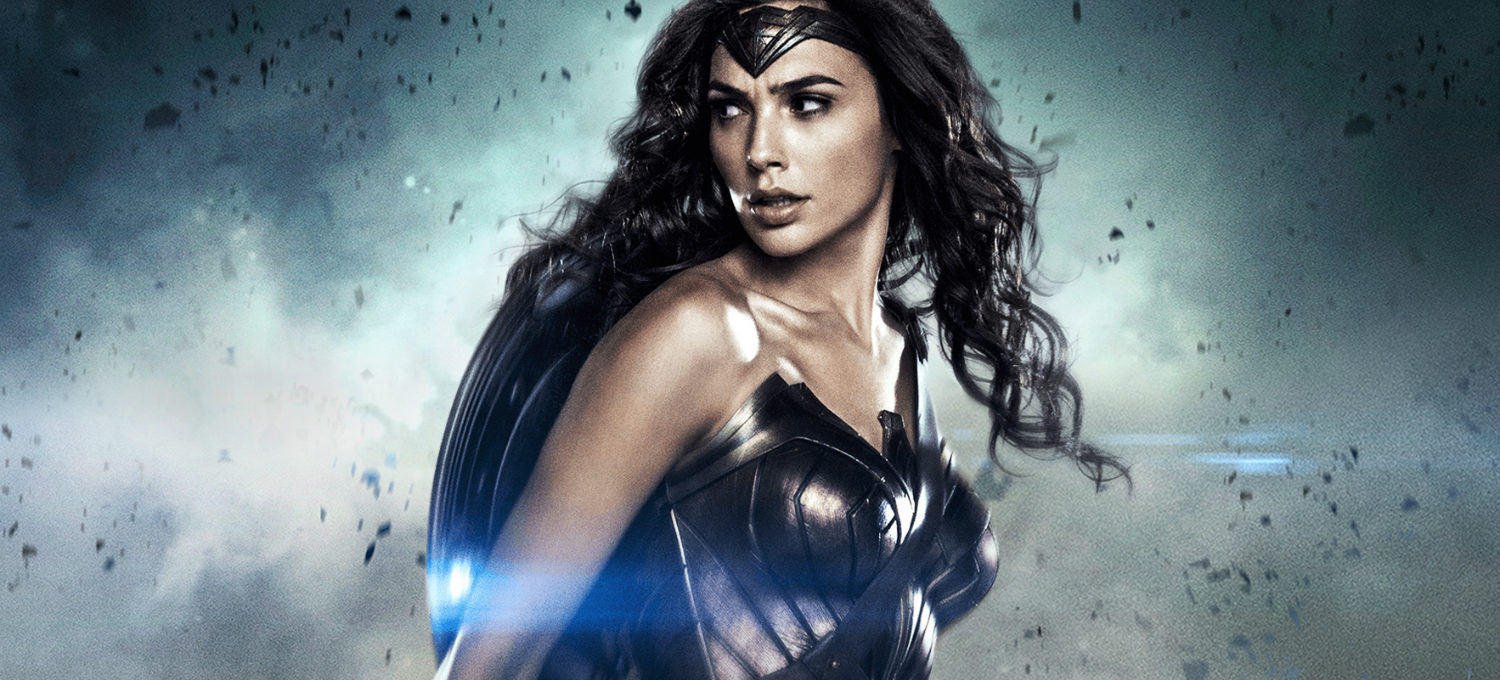Pop Theology is thrilled to welcome Rev. Danielle Shroyer to the site. She’s a theologian, speaker, and the author of Original Blessing: Putting Sin in Its Rightful Place (Fortress Press, 2016). Here, she writes about Wonder Woman and how recognizing, rooting for, and fighting for the goodness in humanity might make superheroes of us all.
In Wonder Woman, the joke is on us. It’s a long-running joke, whose punch line does not give way until the very end of the movie when the audience, if anything like me, has felt every facet of its tension: is Diana right about humans, or is she impossibly, maybe even embarrassingly, naïve? After all, who among us could say with a straight face that evil is a simple problem to fix? That all the world’s problems could be solved if just one errant god was eviscerated? Poor Diana, whose pre-modern myths and protected innocence have kept her so removed from the mess that is humanity.
We watch for nearly two excruciating hours as Diana is patronized, hushed, and mansplained to a nearly comical degree about “what’s really happening” and “what really needs to happen.” They are all male solutions created as a response to all male problems. And furthermore, they are such secular, educated, human solutions, ones that willingly respond to certain facts and figures and that chastise and chasten silly notions of any supernatural or spiritual kind.

In between lighter moments of watching Diana’s legitimate confusion over the role of secretaries and the lack of rationale behind female clothing styles, we watch as she is led from one male-dominated room to the next; from briefing room to bar to battle, Diana’s femaleness—not to mention her unknown goddess stature—are displayed as nothing but an inconvenience.
Until they aren’t.
After all that shushing and mansplaining, Diana finds herself, at long last, at the front lines of battle like she’s asked. But for all their strength, the most powerful armies of the world are entrenched, trapped, and hiding. They are at a total standstill. And the civilians they have sworn to protect—men, women and children in the village just beyond—are suffering the most. Diana’s first response is to help, to intervene, and she is dismissed again, told by a man that she does not understand how complicated this mess is—a mess that these same men have created—and the she can’t possibly do anything about it, any more than they can.
Well. Here’s where the joke will be on Diana, or on us.
As it turns out, the joke is on us. Diana refuses to listen, and instead flings herself into battle, knocking away every bullet that comes in her direction. She launches a relentless charge, until every last soldier holding that village captive has fled. Diana chooses to reject the words of every man who has told her what is impossible and simply does it instead, which is what every Wonder Woman who has ever lived has done, goddess or otherwise. And that would be a good moral of the story, if that was all there was, because God knows we should be reminded of how often women do just that.
But that isn’t all there is. Because the real story is that Diana believed in the power of our humanity even when we didn’t. Apparently it always takes a god to believe in humanity first, because our own belief is so often lacking.
The question of the nature of humanity is brought into the center of this movie time and again. Fueled by jealousy for humans, Ares seeks to prove that humans are evil. Ares is like a place-holder for proponents of original sin, who contend that our potential for evil is more powerful than our inherent goodness. Diana, on the other hand, believes in original blessing. At first, she holds this belief naively, thinking all humans are only good and not at all evil. What she must decide to do when confronted with the evil all around her is whether to hold onto her belief in human goodness. And she does. The concluding lines of the film reaffirm her belief that humanity is made good and can choose to live into it. And we’re reminded, in the scene between Ares and Diana, that even Ares knows this is true. He confesses that he cannot control humans, only whisper his ideas of evil to them over their shoulders. What they do with those suggestions is always and only their choice.
In retrospect, so much of the film was about the audacity of the human choices we make, choices that so often favor evil and violence. Diana is perceived as naïve for not understanding the complexity of them, only because they are, to her, quite simply wrong, and perhaps even infantile. We find our hubris rightly chastened. And by the end, we are reminded that if there is evil happening, we ourselves are the ones to blame.
But we also find that Diana’s seemingly pre-modern ramblings about Ares happen to be right. Though she does not end all war by killing him, as she supposed, her victory over him is certainly not nothing. And despite all eye rolls to the contrary, Diana proves that she knows her own destiny: she is meant to kill the God of War, and she is the only one who can.
In a society increasingly queasy about spiritual stories that sound naïve and suspect, it may behoove us to see a goddess hold onto such a story in a way that brings her exactly where she needs to be and forms her into exactly who she is meant to be. And it may behoove us most of all to recognize that it does so despite being off in one of the details. Perhaps we can see the ways we have treated spiritual stories and parables, not to mention classic myths and fairy tales, in ways that demean them rather than activate them. Diana shows the power inherent in these stories when they release in us the courage to do what is honorable and good.
This has always been the purpose of original blessing as well. In Genesis 3, when Adam and Eve take a bite of the fruit, they must learn that they are capable of both obedience and disobedience, of faithlessness and faithfulness. And then they are sent out into the fertile field of creation to courageously practice choosing the good, until wisdom becomes their primary language. They are not cursed and sent away. They are blessed and sent out, on a journey not unlike our lassoed heroine.
In the end, we watch Diana take a bite out of the fruit of the knowledge of good and evil. Her eyes are opened, and she sees clearly: war will not end even with the vanquishing of the God of War. It is a sobering and potentially devastating blow. What will she do now?

She is not the only superhero to confront this question. After being awakened to evil by the murder of his parents, Batman becomes a vigilante crusader whose morals and values are often very gray, whose motives and responses are often cynical. He refuses to take a life, but he’s pretty wide open to any other idea. His driving engine is one of revenge. We watch Batman struggle internally with his desire to fight the darkness while being captivated by it. We watch him respond in convoluted and contradictory ways to the power and privilege he has so abundantly been given. We watch him struggle with relationships, with friendship, with love.
This is not what happens in Wonder Woman. Diana is not guided by the underside of justice, but by justice itself, by truth itself, by a deep commitment to goodness and virtue. Diana emerges from disillusionment as a wiser woman rather than a cynical or vengeful one. And this may be her most potent superpower of all. After everything she has learned, everything she has seen, Diana does not allow the evil of the world to taint her commitment to the good in it. What she realizes is that the good is worth fighting for even more than she had previously imagined.
In the end, Wonder Woman is a coming of age story. It’s a story that reminds us that even goddesses, even superheroes, have to come to terms with the complex intertwining threads of good and evil that pervade almost everything around us. The power of the movie came in watching Wonder Woman make this journey from innocence to knowledge to wisdom in such rapid and yet believable form. She is not the type to sit out of the fight and ponder the existential crisis of evil. She manages to hold onto the purity of her innocence while stripping herself of whatever may have been naïve.
What we are left with at the end of the film is a world surprisingly parallel to our own: one populated with horrifying stories of evil, and inspiring stories of service to others even at the cost of sacrifice. It is a world filled with people who are rooting against humankind, and people who are rooting for it. Diana has chosen her side, and she chooses to believe in and cultivate and fight for the inherent goodness within all people. And if you disagree with her, you may find yourself confronted with her Lasso of Truth in your face.
